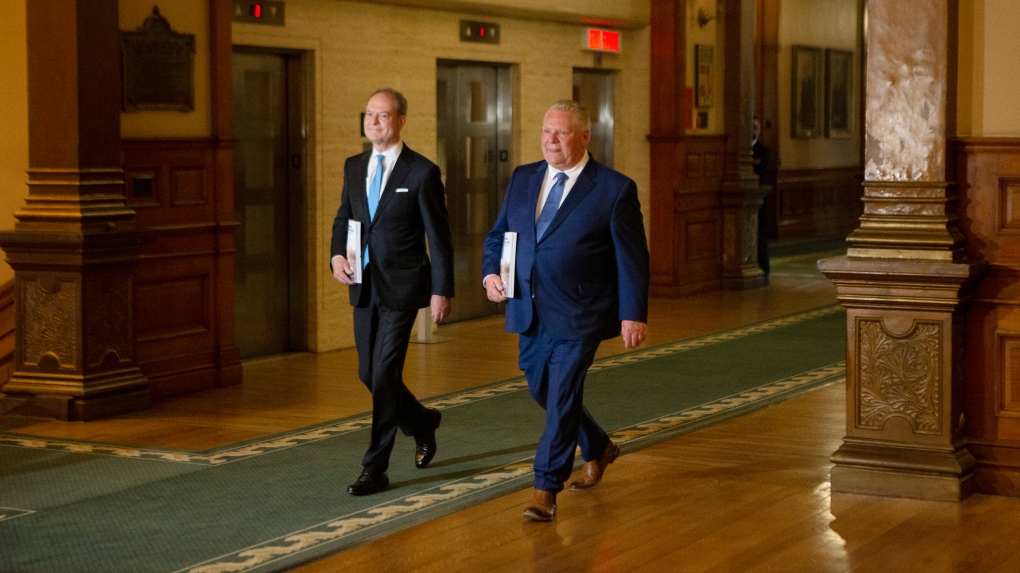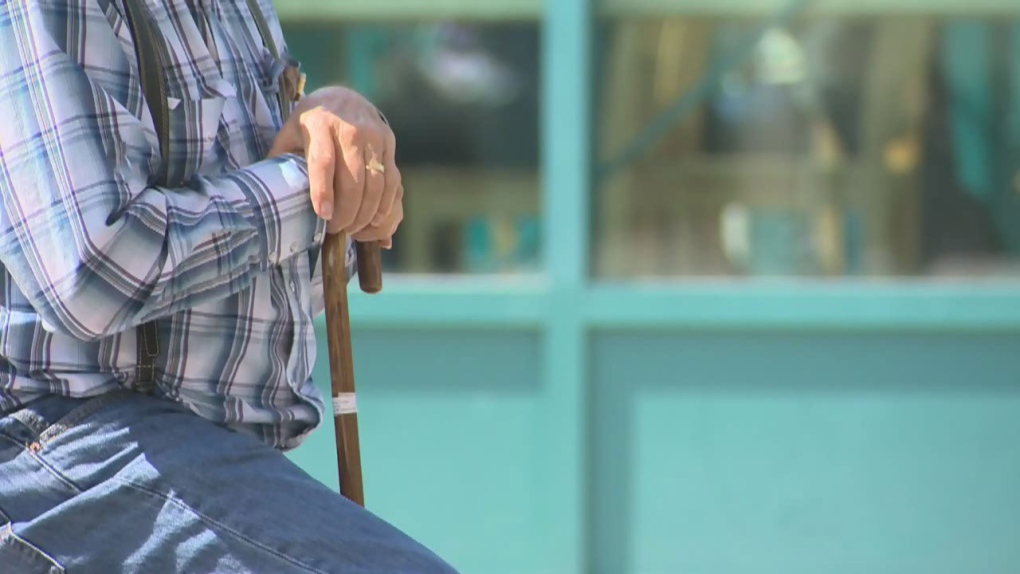Ontario's budget to be re-tabled: This is what Doug Ford promised
The Progressive Conservatives are set to re-table their 2022 budget today, nearly three months after it was presented to Ontarians.
The 268-page document was first tabled in late April, but before any debate or discussion could take place, the legislature was adjourned so that MPPs could campaign for the June election.
The budget then became Premier Doug Ford’s re-election platform. The plan pledges billions of dollars to build and revitalize infrastructure, as well as a number of affordability-themed promises, including a new personal income tax credit for seniors.
Lieutenant Governer Elizabeth Dowdeswell will make the Throne Speech at 1 p.m. on Tuesday and then the budget will be presented yet again to the legislature. The document is likely going to be similar if not exactly the same as the one presented in April.
- Download our app to get local alerts to your device
- Get the latest local updates right to your inbox
Officials have made it clear that the slight tweaks to the budget—including a five per cent increase in funding for the Ontario Disability Support Program promised on the campaign trail—won’t make a significant difference in the province’s overall spending plan.
Here are some of Ford’s largest promises as outlined in the PC’s nearly $200-billion budget:
A FOCUS ON TRANSIT
Throughout his campaign, Ford made it clear that he has a plan to say “yes” to building and revitalizing the province following the pandemic.
The 2022 budget outlined just over $25.1 billion over 10 years for expanding and creating highways, roads and bridges across Ontario. This includes the Bradford Bypass and the controversial Highway 413, which has yet to be given a precise price tag.
 Peter Bethlenfalvy, Ontario's Minister of Finance, left, arrives with Premier Doug Ford to deliver the provincial government's 2022 budget at the Queens Park Legislature, in Toronto, on Thursday, April 28, 2022. THE CANADIAN PRESS/Chris Young
Peter Bethlenfalvy, Ontario's Minister of Finance, left, arrives with Premier Doug Ford to deliver the provincial government's 2022 budget at the Queens Park Legislature, in Toronto, on Thursday, April 28, 2022. THE CANADIAN PRESS/Chris Young
The government has also earmarked $61.6 billion over 10 years for transit projects, which include the Ontario Line in Toronto—a rapid transit system that will connect the Ontario Science Centre to Ontario Place—as well as a number of GO Rail extensions.
The PCs have also said they would eliminate double fares when transferring to GO Transit, a pledge that will likely impact most local systems, with the exception of Toronto.
HEALTHCARE DOLLARS EARMARKED FOR INFRASTRUCTURE
The PCs have put more than $40 billion aside over the next 10 years for hospital infrastructure, something they say is $10- billion more than what was committed in 2021.
No changes will be made to coverage for medications under OHIP.
Ontario’s opposition parties have called for a new budget to be drawn up that better addresses other health-care challenges, including staff shortages. While health-care experts have criticized the government for not taking further action as emergency rooms closed and patients were redirected, the province’s new health minister said Monday that things are not as dire as they seem.
"It disturbs me, as I'm sure it does many, when they find that their hospital has to close for four hours, a shift, a period of time,” Sylvia Jones said in a scrum at Queen’s Park. “But to suggest that it is in crisis, is completely inappropriate."
Unions have long called for the repeal of Bill 124, which caps salary increases for public sector employees such as nurses, so that staff can be paid what they deserve.
When asked about Bill 124, government officials have pivoted to touting a $5,000 retention bonus they offered staff back in March.
The 2022 budget also includes an investment in recruiting and retaining health-care providers.
NEW TAX CREDIT FOR SENIORS
A surprise addition to the April budget was a personal income tax credit meant to offset the costs of some home care medical expenses for individuals over the age of 70.
 A senior is pictured in this file photo.
A senior is pictured in this file photo.
The credit will offer seniors a refund up to 25 per cent of eligible expenses up to $6,000 for a maximum credit of $1,500.
The credit will be available for seniors earning less than $65,000 a year and is expected to cost about $110 million in 2022.
INCOME TAX CUT FOR LOWER-INCOME WORKERS
The government also promised to cut income taxes for Ontarians earning less than $50,000 a year.
The Low-Income Individuals and Families tax credit was originally available for individuals earning less than $38,000 a year.
The province said that about 1.1 million taxpayers will benefit from an additional $300 a year on average as a result of expanding the program.
LIFT was first introduced in 2018 by the Ford government as a way to counter the cancellation of a $15 minimum wage, a decision that was made once the Progressive Conservatives took office.
The program expansion will cost taxpayers $400 million a year.
SAVINGS FOR DRIVERS
Licence plate renewal fees have been scrapped—a move that will save drivers about $60 to 120 per year. This will cost the government about $1.8 billion. The gas tax has also been cut by 5.7 cents per litre and the fuel tax has been slashed by 5.3 cents per litre.
Relief at the pumps may be short lived however, as the government only plans to keep these measures in place until Dec. 31.
OTHER PROMISES INCLUDE:
• A 50-cent increase in the minimum wage
• An additional $3.5 million for emergency preparedness measures
• About $96 million over three years to equip and train Ontario police services to respond to future protests and blockades at land borders
CTVNews.ca Top Stories

B.C. tenants evicted for landlord's use after refusing large rent increase to take over neighbouring suite
Ashley Dickey and her mother rented part of the same Coquitlam duplex in three different decades under three different landlords.
MPP Sarah Jama asked to leave Ontario legislature for wearing keffiyeh
MPP Sarah Jama was asked to leave the Legislative Assembly of Ontario by House Speaker Ted Arnott on Thursday for wearing a keffiyeh, a garment which has been banned at Queen’s Park.
Mountain guide dies after falling into a crevasse in Banff National Park
A man who fell into a crevasse while leading a backcountry ski group deep in the Canadian Rockies has died.
Montreal actress calls Weinstein ruling 'discouraging' but not surprising
A Montreal actress, who has previously detailed incidents she had with disgraced Hollywood producer Harvey Weinstein, says a New York Court of Appeals decision overturning his 2020 rape conviction is 'discouraging' but not surprising.
Saskatchewan isn't remitting the carbon tax on home heating. Why isn't my province following suit?
After Prime Minister Justin Trudeau said the federal government would still send Canada Carbon Rebate cheques to Saskatchewan residents, despite Saskatchewan Premier Scott Moe's decision to stop collecting the carbon tax on natural gas or home heating, questions were raised about whether other provinces would follow suit. CTV News reached out across the country and here's what we found out.
Expert warns of food consumption habits amid rising prices
A new survey by Dalhousie University's Agri-Food Analytics Lab asked Canadians about their food consumption habits amid rising prices.
Charlie Woods, son of Tiger, shoots 81 in U.S. Open qualifier
Charlie Woods failed to advance in a U.S. Open local qualifying event Thursday, shooting a 9-over 81 at Legacy Golf & Tennis Club.
Caleb Williams goes to the Bears with the No. 1 overall pick in the NFL draft
Caleb Williams is heading to the Windy City, aiming to become the franchise quarterback Chicago has sought for decades.
Body of Quebec man who died in Cuba found in Russia, family confirms
A Montreal-area family confirmed to CTV News that the body of their loved one who died while on vacation in Cuba is being repatriated to Canada after it was mistakenly sent to Russia.

































